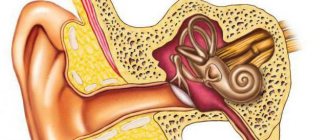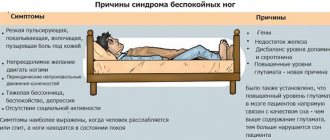Children with intellectual disabilities need double parental love and additional care from specialists. Neither in the yard, nor in kindergarten, nor at school are such “peculiar” children greeted with smiles and friendly hugs.
Not like everyone else, they cause wariness and sometimes open aggression on the part of others. Therefore, it is necessary to provide them with all the conditions to prepare for independent life in society.
Types of intellectual impairment
The human body consists of 100 trillion. cells. Each cell encodes up to 100 thousand genes. The cell nucleus carries a clear program of life, compiled from the contributions of our ancestors. This program is contained in chromosomes and represents the genetic code.
Genes on chromosomes determine the physical and biochemical properties of a person. They are more or less involved in all functions - from individual cells to physical characteristics and development. The complete set of 46 chromosomes is called the cell genome.
Given this complexity, it is not easy to answer the question of the exact causes of low intelligence. Such a disorder can be associated with any circumstances that impede brain development before, during or after childbirth.
When intelligence declines, the reasons lie not only in a person’s genotype or genetic defects. Mental retardation can also be caused by various environmental factors such as drug use, nutritional deficiencies, poverty or cultural deprivation. It has been found that more than 50% of people with intellectual disabilities have more than one cause of the disorder.
Organic brain lesions, as a rule, lead to persistent irreversible impairment of mental activity. The consequence of this is various forms of intellectual impairment. This is otherwise called “mental retardation.” There are two types of intellectual disability:
- oligophrenia is a congenital form of intellectual underdevelopment;
- Dementia is a form of dementia acquired during life.
Congenital oligophrenia, in turn, can be of varying degrees of severity and severity. There are three main subtypes of this pathology, namely:
- mild degree of oligophrenia (debility). The characteristics of intellectual disabilities are as follows: the presence of certain mental abilities (speech formation, mechanical memory, ability to count), this form allows you to perform low-skilled physical labor;
- moderate underdevelopment (imbecility). This form is characterized by poor and tongue-tied speech, very low learning ability, and clumsiness. With such a pathology, the patient can be accustomed to minimal self-care, but he must perform any simple work exclusively under external control;
- An extreme degree of underdevelopment (idiocy) is characterized by a complete absence of mental thinking and speech, and a complete inability to acquire self-service skills.
Oligophrenia is a consequence of pathologies of intrauterine development, pathological, constitutional and genetic influences on the fetus, as well as a consequence of brain damage in the first three years of a child’s life. The main signs of oligophrenia include the following impairments of intellectual activity according to severity:
- any mental defect combined with disorders of speech, motor skills, memory, expression of emotions, behavioral defects;
- total mental underdevelopment.
Another, no less common form of intellectual disability is dementia, which is always acquired and never congenital. Dementia is characterized by mental (intellectual) degradation, a decrease in emotional manifestations, will, and withdrawal from the circle of interests inherent previously.
Considering this pathology, we can distinguish the following subtypes: total (or global, diffuse) and focal (lacunar). With total dementia, intellectual abilities are completely impaired. Personality disintegrates, acute memory disorders are observed, and there is no critical worldview.
Such dementias can be the result of brain injuries, cerebral disorders of the brain, repeated strokes, and can develop in old age. In partial dementia, intelligence is partially preserved and selective memory is present. Conditions of acquired dementia are characterized by dizziness, frequent headaches, nausea, convulsions, spasms, and mental disorders.
Separate attention should be paid to the manifestations of organic dementia in children, since its signs should cause concern:
- neurodynamic pathologies such as rapid mental fatigue, sudden slowdown in actions, inability to handle various types of stress, disturbances in logical thinking;
- lethargy, slowness, passivity, apathy, low initiative;
- violations of critical perception and purposefulness of thought.
Dementia
The deterioration of cognitive abilities in dementia occurs in parallel with the impoverishment of emotions, decreased emotional control and motivation, and behavioral disorders. The prevalence of dementia increases with age - 20% of people over 80 years of age suffer from the pathology.
5% of people over 65 years of age are diagnosed with severe dementia, and 10-16% have mild to moderate forms of the disease. The causes of intellectual impairment are polymorphic and are associated with a high risk of organic brain damage in old age. Often the pathology develops against the background of neurodegenerative processes - Alzheimer's disease (about 60% of cases) and Parkinson's disease.
Often the cause of dementia is vascular disease (about 10% of cases), tumors localized in the brain, and infectious lesions of the central nervous system. Cerebral vascular diseases in combination with Alzheimer's disease cause dementia in 20% of cases.
Determining the exact causes of dementia is necessary to prescribe adequate treatment. Correct treatment slows down the progression of the pathological process. Often after a course of therapy there is an improvement in intellectual activity.
Symptoms
Symptoms of intellectual impairment can be quite varied: some children may experience deterioration in learning, difficulty or inability to self-care, sometimes a decrease in intelligence can be combined with mosaicism, partiality and the development of individual functions.
Mental retardation is manifested by a decrease in intelligence below average, to the level of a borderline state with mental retardation. There are two variants of the clinical picture. In the first case, cognitive activity is impaired as a result of insufficient development of the emotional-volitional sphere, and a lack of interest in cognitive activity comes to the fore.
Such kids are active, impulsive, prefer simple games, are not interested in creative and educational activities, and are difficult to organize and encourage to read and draw. The second option is manifested by insufficient formation of memory, performance, and attention. Children lack initiative, are not independent, are overly active or passive, work at a slow pace and get tired very quickly.
Classification
Intellectual disabilities in childhood are divided into quantitative and qualitative. The first group includes:
- Impaired mental function. Slow maturation of the morphofunctional systems of the brain occurs under the influence of unfavorable factors and is expressed by the immaturity of psychomotor and cognitive functions.
- Mental retardation. It is a mental retardation - a persistent congenital or early acquired impairment of intelligence. There are three degrees: mild (moronicity), moderate (imbecility), severe (idiocy).
- Dementia. Acquired persistent or progressive dementia, developing as a result of the loss of formed intellectual functions.
Qualitative intellectual impairments in children are caused by uneven development of mental, psychophysiological, emotional and volitional functions. We are talking about a disorder in cases where the uniqueness of the intellect prevents the child from adapting to the environment at the level of everyday self-care, social interactions, and mastering educational skills. Qualitative changes are found in schizophrenia, early childhood autism, diseases of the sensory organs, and speech pathologies.
Diagnostics
Diagnosis of intellectual and developmental disorders, including in the early stages in children, allows us to identify deviations in the development of mental abilities and take a range of important measures to eliminate possible causes and consequences. Conditions for positive results of activities:
- Initial level of intelligence.
- How significant is the deviation from the norm?
- Correct diagnosis.
- History and reasons.
To identify the initial level, the magnitude of its deviation and the correctness of the diagnosis, psychiatrists use a number of tests.
Intellectual disabilities in children are determined during a conversation; such children are prescribed intelligence tests, magnetic resonance and computed tomography of the brain.
Intellectual disabilities in children
Intelligence is a complex concept that includes the ability to accumulate experience and knowledge, the ability to apply them to solve problems, and adapt. The prerequisites for the development of intelligence are cognitive functions - attention, memory, spatial perception, thinking, as well as psychophysiological characteristics - performance, initiative, cognitive interest. Intellectual impairments are qualitative and quantitative deviations in the development of mental abilities. They can be a central symptom of the disease (oligophrenia, dementia, mental retardation) or one of the secondary ones (epilepsy, schizophrenia, endocrinopathies). There are no exact data on the prevalence of intellectual disabilities; they are reliably more often detected among the rural population, which is explained by simpler living conditions that require less effort to adapt.
Prevention
Over the past thirty years, research has been able to reduce the incidence of mental retardation. In particular, this was achieved through neonatal monitoring of phenylketonuria (and subsequent nutritional adjustments) and congenital hypothyroidism (thyroid hormone replacement), and the use of anti-Rh globulin for neonatal jaundice.
Despite diverging opinions about vaccination, its positive effect on reducing the incidence of intellectual disability in the case of measles and rubella vaccination has been proven.
Gradual removal of lead from the environment reduces brain damage in children. Preventative measures such as the use of child car seats and bicycle helmets limit the incidence of head injuries.
Early intervention programs for vulnerable infants and children are important to limit expected decline in intellectual abilities.
Early, comprehensive prenatal care and preventative measures before pregnancy increase women's ability to prevent mental retardation in their unborn children. Childhood AIDS is reduced by highly active antiretroviral therapy for women during pregnancy, and folic acid supplementation reduces the risk of neural tube disease.
Scientists continue to explore new ways to prevent intellectual disabilities, including research on the development and functioning of the nervous system, a wide variety of treatments for congenital disorders, and gene therapy aimed at correcting abnormalities caused by gene disorders.
Prevention of intellectual disabilities includes timely identification of genetic pathologies, reducing the likelihood of perinatal, natal and postnatal adverse effects, and creating favorable conditions for the comprehensive development of the child.
Causes of intellectual disabilities in children
Intellectual disability develops as a result of the negative influence of endogenous and exogenous factors. The more intense and early the exposure, the more serious disorders are determined in the child. The following groups of reasons are distinguished:
- Genetic changes. Deviations in intellectual development are determined by chromosomal abnormalities - trisomy (Down syndrome), chromosome deletions, uniparental disomies; with dysfunctions of individual genes (autism, Rett syndrome).
- Perinatal damage to the central nervous system. Hypoxia caused by maternal diseases (cardiovascular, endocrine pathologies, kidney, liver diseases), incompatibility of the pregnant woman and the fetus according to the Rh factor, the ABO system, intrauterine infections, intoxication, radiation exposure, severe emotional stress during pregnancy, and prematurity have a negative impact.
- Natal damage to the central nervous system. Complicated childbirth, accompanied by asphyxia, blood loss, and fetal injuries, can lead to organic and functional brain disorders.
- Postnatal damage to the nervous system. Intellectual impairments of varying severity develop with neuroinfections (encephalitis, meningitis), epilepsy, severe endocrine, autoimmune diseases, intoxications, traumatic brain injuries, dystrophies, and after clinical death.
- Mental, neurological disorders. Intellectual disorders arise against the background of behavioral, emotional, volitional defects, and pathologies of the analytical systems.
- Social factors. Deviations of intellectual development are revealed in disharmonious family relationships, an asocial lifestyle of parents, pedagogical neglect of children, and long stays in hospitals.
Manifestation
At the very beginning, the patient cannot show his feelings to others in ordinary situations. Then everything only gets worse, and the person is no longer capable of any feelings, his emotional reactions decrease, he looks distant, insensitive and cold.
A person loses the meaning of life and sense of purpose. In advanced cases, the patient’s character completely changes beyond recognition and acquires features that are unusual for him. Clarity of thinking is impaired. It is difficult for a person to focus on one thought and express it. He loses interest in any of his past hobbies and eventually withdraws into himself, becoming fixated on his internal thoughts.
Stress in young people causes stupor in life or negatively affects productivity
Many young people complain that: “Everything is falling out of my hands, I can’t concentrate on anything, my memory has disappeared and my efficiency tends to zero.” They go to the doctor with these symptoms and there they learn that loss of productivity may be associated with stress or depression.
STORY
“I look at the computer and see a set of letters” Alexander, 35 years old
High blood pressure and decreased productivity began to be treated with pills, including “memory” pills, but the situation did not change. Then Alexander was referred to a psychiatrist.
“I was afraid to go, I thought that they would recognize me as crazy and would treat me so that I would become a “vegetable.”
But everything ended well. After a course of psychotherapy and treatment for stress, Alexander began to recover. Sleep returned to normal, memory and performance were restored, and after ten days of treatment Alexander was discharged.
LET'S SUM UP
The emotional state and mental abilities of young people are directly related to each other. Sometimes it is enough to reduce the level of anxiety in order to restore your performance, memory and mental abilities.
IF YOU BEGAN TO NOTICE A DECORATION IN YOUR MENTAL ABILITIES, THE FIRST THING YOU NEED TO DO IS THIS
Before you do an MRI of the brain and start taking memory pills, think: “Am I worried about something?” As you already understand, the saying “all illnesses come from nerves” is a “correct” saying and it can explain a lot. Melancholy, tearfulness, self-doubt, feelings of loneliness, negative thoughts or self-flagellation are all markers of a nervous disorder. If one of these points is yours, analyze the root cause of this condition and take measures to improve your mental state. If you are old, then stress or nervousness can cause a “dementia attack”; if you are young, then stress can cause decreased productivity or deterioration of mental abilities.
But the good news is that with this type of illness, intellectual improvements will be noticeable within a couple of weeks after sedative therapy.
Oleg Pletenchuk, based on materials from psychologies.ru
An intellectual disorder is called dementia. This condition implies that impaired intellectual functioning causes problems with abstract thinking. Also, the process of rational cognition is disrupted, which may be due to memory impairment. In this case, the patient loses the ability to focus on what is essential and important; he cannot evaluate his condition critically. Among intellectual disorders, there are two types: dementia and mental retardation. If dementia occurs, then intellectual disorders such as total dementia and lacunar dementia are distinguished.
An important sign of acquired dementia is the loss of previously existing knowledge and experience. Moreover, loss can also be different - complete or partial. In particular, it can be a poorly reversible or irreversible condition. If oligophrenia is diagnosed, then its basis is not decay, or even complete loss of knowledge, but underdeveloped intelligence and cognitive activity in general, representing the consequences of arrested development or delay in cognitive processes occurring in the early postnatal period. Dementia differs from mental retardation in children in that mental disorders are mosaic, and individual cognitive functions are unevenly reduced. It happens that only one of the functions is preserved, vocabulary and acquired skills are unevenly preserved.
Factors such as disturbances in attention, mental activity, performance, and memory are considered an important sign of intellectual disability. In particular, caution should be exercised if the purposefulness of mental activity is impaired. The peculiarity is that such patients themselves notice that they are completely incapable of working. They are critical of it, demonstrating affective type reactions. At the same time, in such patients the previous behavioral form is preserved, the manner of speaking and communication does not change. In this case, experts say that the “core of personality” remains unchanged.
Causes of intellectual disability
In recent years, scientists have conducted many studies, during which it has been proven that intellectual disability is a serious reason for contacting a medical institution. There is a high probability that the cause of intellectual disorder is not age-related changes, but a specific disease. For example, the cause of this disease is often various degenerative or vascular diseases, as well as diseases associated with the nervous system. If there is slight atrophy, it is not surprising that it causes some memory problems in an elderly person.
It could be forgetfulness, or a minor intellectual disorder, that is, dementia. As a rule, such manifestations are always attributed to age. Including, the most common form of dementia caused by atrophy is. As a result, this disease leads to progressive intellectual disability. If, as an example, we take another disease, for example, Pick's syndrome, which affects a small area of the brain, then it is quite obvious that the development of pathology occurs more slowly. In this case, areas of the frontotemporal region atrophy.
If the patient experiences confusion, there is no clarity of perception, he has difficulty oriented both in time and in space, and his behavior is characterized by sudden changes, then in this case, the syndrome is called delirium. This is a complex neuropsychiatric condition that causes intellectual disability. The older the patient, the higher the likelihood of this condition occurring. Delirium itself is similar to many symptoms of other mental disorders. To diagnose it, a consultation with a highly qualified psychiatrist is required.
Treatment of intellectual disorder
Treatment of this disorder is primarily aimed at the underlying disease. Also, the doctor may prescribe the necessary drug therapy. In particular, it is necessary to create special psychological conditions for the patient; in almost all cases, the participation of other specialists and constant monitoring of the patient is necessary. It is especially important that appropriate conditions are created at home; family members should be understanding and communicate with the patient, taking into account the doctor’s advice.
Intellectual disability is a disease that has been known since prehistoric times, and there is evidence of this in the history of psychiatry. For example, transcultural psychiatry has data according to which representatives of uncivilized tribes suffered from atherosclerotic changes in the brain. Therefore, it is not surprising that this issue has been studied quite well by scientists, and specialists have various methods of influence and use various types of therapy in the treatment of intellectual disorder.
In any case, only an experienced doctor can prescribe the correct treatment, taking into account the existing symptoms. As a rule, the structure of an intellectual disorder varies, but negative signs always predominate. If the disease is determined only by these signs, then the patient suffers from simple dementia. Often the initial stage of the disease is represented by mental dementia, which can manifest itself as hallucinations, delusions, depressive or manic syndrome. Moreover, the more clearly such signs are expressed, the weaker the intellectual disorder, and vice versa. Based on such signs, the attending physician selects an individual treatment program that can be applied to a specific patient, and is completely inappropriate
Intelligence is the most important quality of a person, which is expressed in his ability to understand and solve various issues and problems.
This category cannot be limited to such a narrow definition: intelligence includes vocabulary, erudition, the ability to adapt to the realities of the environment, the ability to apply acquired knowledge in practice, and its violation is reflected in human activity, which under such conditions cannot be full.
Social intelligence
Social intelligence disorder is a pathology of social cognition. In general terms, with such a pathology, a person is not able to perceive and control the objects and relationships of society during his activities and adapt to those around him. Of course, social intelligence in itself is not a sufficient condition for the formation of personality, but its good condition is necessary.
Based on the results obtained, it was concluded that intellectual disability is a pathology that was initially considered a consequence of cognitive abilities, but later it began to be identified as an independent process that can be treated, albeit very difficult. Methods for developing social intelligence have also been found, which makes it possible for “special” people to adapt socially.
Such methods include modeling situations from real life, increasing the role of intelligence in everyday practice, motivation of speech (the ability to communicate clearly) and others. Currently, using known methods, patients have the opportunity to join our social world, but it is worth remembering that they require more attention and support.
Causes of pathological processes
As mentioned above, there are congenital and acquired intellectual disabilities. Each type of pathology has prerequisites for its development.
Oligophrenia or congenital dementia is a state of mental underdevelopment. The reasons for its development are factors influencing the process of maturation of the child’s brain. These include the following pathologies:
- viral encephalitis;
- degenerative pathologies of the brain;
- chronic hydrocephalus;
Microcephalus - dysfunction of the endocrine system;
- vitamin B12 deficiency;
- microcephaly;
- congenital infections (herpes);
- negative effects on the fetus during the period of intrauterine development of certain factors (taking certain medications, alcohol abuse, the presence of diabetes mellitus in the mother, radioactive and x-ray radiation);
- prolonged fetal hypoxia;
- brain damage caused during childbirth.
Dementia (dementia acquired in adulthood) is a decrease in a person’s cognitive activity and loss of knowledge and skills acquired earlier. The provoking factors in this case are:
- high blood cholesterol levels;
- severe autoimmune diseases;
- complications of kidney and liver diseases;
- alcoholism;
- vascular disorders of the brain;
- traumatic brain injuries;
- chronic metabolic disorders;
- deviations in the functioning of the endocrine system;
- infectious diseases (chronic meningitis, viral encephalitis);
- severe intoxication of the body (in particular, heavy metal poisoning).
Intellectual development disorders in children are possible due to the following factors:
- gene and chromosomal abnormalities (Down syndrome, Rett syndrome, Alfie syndrome);
- premature birth;
- birth head injury;
- incompatibility of the child and mother according to the Rh factor;
- bacterial and viral brain lesions in early childhood;
- encephalitis;
- meningitis.
Speech and intelligence
If a child cannot speak clearly and articulately, or consciously construct sentences, then this is a reason to think: does he have any intellectual disabilities? Of course, you shouldn't panic right away. Upon examination, a competent specialist will be able to determine what the disorders are associated with - improper brain function or problems with the speech apparatus (bite, etc.). Causes of speech and intellectual impairment:
- Heredity. If the father or mother has any speech disorders, then it is quite possible that these disorders will be passed on to the child.
- Some infectious or inflammatory diseases of the mother during pregnancy can lead to improper formation of areas of the brain responsible for correct speech.
- Diseases suffered in the first months of life also affect the formation of the speech apparatus and speech problems in the future.
- Inappropriate environment (drinking parents, drug addict parents).
- Parents who do not pay enough attention to their children should not be surprised if their children develop speech disorders.
Speech disorders in some cases can provoke low academic performance, mental retardation, misunderstanding with peers, and ridicule.
Therefore, it is worth helping the child, taking him to specialists and making due efforts to correct the deficiencies.
Practical advice for parents
It is important for parents to understand that there are no good or bad emotions. Every emotion experienced by a child is important and necessary for his full and harmonious interaction with the world around him. Through understanding and “living” his own and others’ emotional states, the child must come to control, create and change the world around him for the better. This is what will be the key to his happy future.
At this stage, the child gets acquainted with all the diversity of the emotional world, learns the name of each emotion, how it is expressed, listens to himself, learns to distinguish one emotion from another, and understand the reason for its appearance.
At this stage, parents are advised to:
- tell the child about feelings and emotions through visual material: pictures, manuals, children's literature with illustrations;
- read fairy tales and watch cartoons with rich emotional content together;
- voice your feelings and the feelings of your child in various situations: “I’m very angry now because you broke the cup”, “I see that you are upset because your favorite car is broken”, “Grandma is glad that you gave her this wonderful drawing";
- Ask your child every day: “What’s your mood today?”, “How did you feel today?”
The child learns that not only he, but also other people have emotions and feelings, learns to determine what another person is experiencing by his facial expressions, posture, behavior, learns to support and empathize.
Parents will find it useful:
- don’t “sculpt” yourself into being ideal, happy and satisfied with life 24 hours a day. The child should see you for real: sometimes upset, sometimes tired, and sometimes angry. Only then will he learn to understand the feelings of other people and change his behavior in accordance with them: “Dad is upset today, he has troubles at work, let’s not play noisy games today, but watch a cartoon in your room”;
- discuss the behavior of fairy tale and cartoon characters: “What do you think Vasilisa the Wise felt when Ivan Tsarevich burned the frog’s skin without asking?”, “What do you think Kolobok’s mood was when he rolled away from his grandparents?”;
- develop a child’s sense of empathy and compassion. Don't forget that mom and dad are role models for their children. If your family does not have trusting relationships, an atmosphere of love, acceptance and support, all these feelings will remain inaccessible to the child.
Once a child learns to understand and analyze what he feels, he will be able to control and manage his emotional state.
Parents need:
- teach your child acceptable ways to get rid of anger and anger: beat a pillow, tear paper, stomp your feet;
- teach to listen to bodily sensations;
- Together with your child, choose ways to raise your mood: go for a walk in the fresh air, watch a cartoon, listen to fun music.
To become a happy and successful person in the future, a child needs to learn to interact with the people around him: establish and maintain interpersonal relationships, provide timely help and support, resolve conflicts, and be able to work in a team. This can be achieved only by being well aware of your own feelings and the feelings of other people. And - like the top of the pyramid - use your emotional resource to achieve your goals, personal growth and self-realization.
It is important for parents:
- develop the child’s communication skills through joint games with adults and peers, watching cartoons and films, reading literature on the topic of friendship and friends;
- develop adequate self-esteem, independence, and self-confidence. The child must be aware of responsibility for every action he makes and be prepared for the consequences.
Emotional intellect
Basic emotional intelligence disorders can manifest as an uncontrollable outburst of emotions in response to certain situations. As a rule, a person in this case, reacting emotionally, is not aware of the extent of his feelings.
An emotional response, or, in other words, emotional reactions expressed in an acute form, is what a person experiences in a given situation. They are somewhat similar to mood swings, but last much less.
Clinical picture
All intellectual disabilities are characterized by a general clinical picture and symptoms:
- deterioration of memory, perception, attention, thinking, speech;
- weakness of judgment;
- inability to generalize;
- lack of initiative;
- intellectual inactivity;
- passivity;
- low self-esteem;
- aggressiveness;
- limited vocabulary;
- weakness of cognitive interests;
- lack of habit of self-control;
- problems with logical thinking;
- narrow-mindedness;
- primitiveness of interests;
- difficulties in the process of acquiring new knowledge and perceiving information;
- inability to analyze materials and the current situation;
- difficulty switching attention from one subject to another;
- character traits such as vindictiveness, pickiness, pedantry;
- emotional impoverishment to the point of stupidity;
- reducing the volume of response, which is reduced to physiological needs;
- autism;
- lack and misunderstanding of speech;
- inactivity and unproductivity.
Autistic child
Depending on the type of intellectual atrophy, certain symptoms predominate, while others are not observed at all or are less pronounced.
In particular, autistic children are characterized by bradyphrenia with a predominance of depressive symptoms and intellectual impairment to varying degrees.
Hearing and intelligence
Children who have both hearing impairment and intellectual impairment are slow to recognize changes in the space around them, have poor self-awareness, and rarely know how to control their emotions, behavior, and actions. There are several types of combination of these violations:
- One disorder is congenital, and one is acquired (hearing impairment is congenital, and intellectual disability is acquired as a result of illness or vice versa).
- Both disorders are congenital.
- They are acquired as a result of illness or injury.
Teaching schoolchildren with intellectual disabilities is impossible in regular schools, since it will be extremely difficult for them to understand the teacher’s tasks and even more difficult to cope with them at the proper level. A different approach is needed here. There are two solutions: the first is studying at home, the second is studying in a specialized institution.
When studying at home, a child with hearing and intellectual impairments will not feel out of place. The specialist will find an approach, will be able to interest the student and make the learning process easy, colorful and interesting. Studying in special institutions is also a good option. In addition to the correct educational process and proper attention from specialists, the child will receive communication skills, learn to contact other people, make friends, help and support.
Literature
- Bitensky V. S., Goryachev P. I., Melnik E. V. and other Psychiatry: Course of lectures: Textbook = Psychiatry: Course of lectures: Basic handbook / Ed. Bitensky V.S. - Odessa: ONMU, 2004. - 354 p. — 1000 copies. — ISBN 966-7733-56-4.;
- Zamsky Kh. S., Konyaeva N. P. [www.academia-moscow.ru/off-line/_books/fragment_9513.pdf Mentally retarded children: The history of their study, education and training from ancient times to the middle of the 20th century: a textbook For university students]. - 2nd ed. - Moscow: Publishing House, 2008. - 368 p. — ISBN 978-5-7695-4334.
- Morozov G.V., Shuisky N.G. Introduction to clinical psychiatry (propaedeutics in psychiatry). —Nizhny Novgorod: Publishing House of NGMA, 1998. — 426 p. — 3000 copies. — ISBN 5-86093-010-0.;
- O. V. Kerbikov, M. V. Korkina, R. A. Nadzharov, A. V. Snezhnevsky. Psychiatry. — 2nd, revised. —Moscow: Medicine, 1968. — 448 p. — 75,000 copies;
- Yu. V. Kannabikh. History of psychiatry. - Leningrad: State Medical Publishing House, 1928.
Basic tests, their features and differences
At the initial stage of a person’s life, an assessment of psychomotor and speech development is carried out. The assessment is carried out by observing the child. The development of speech, the ability to distinguish the color of objects and their size, as well as the accuracy of his movements are assessed. Psychological methods for studying personal understanding of sayings, poems, etc. are widely used for preschoolers and students.
- The main test for diagnosing intellectual disability is the Wechsler technique, most people know it as IQ.
- Eysenck test. It should be understood that in order to correctly diagnose intellectual disability, such tests must be performed only by experienced psychiatrists. It is also important to understand that the study should be carried out only in dynamics.
Pathogenesis
The pathogenetic basis of intellectual disorders in children is encephalopathic and cerebrasthenic changes in the central nervous system, psychosocial conditions of development. Functional, organic abnormalities of brain function according to their etiology can be hypoxic, traumatic, toxic-metabolic, infectious. They are manifested by excitation or inhibition of central nervous system activity, symptoms of intracranial hypertension, convulsive syndrome, dysfunction of the brainstem, insufficiency of cortical-subcortical interactions, and local damage to certain areas of the cortex. The severity of an intellectual defect, its totality or partiality, and the possibility of compensation are determined by the psychological characteristics of the child and social conditions.
Treatment options
Treatment for intellectual disability in adults and children will differ significantly depending on the stage of the disease. It is worth understanding that everything is purely individual.
There is a specific treatment for intellectual disability - this is therapy aimed at eliminating the causes that led to intellectual disability. After identifying the causes, individual therapy is selected for each patient. Of no small importance in restoring intelligence, regardless of whether the impairments were congenital or acquired, is the patient’s adaptation to society.
A special program must be drawn up for children, including educational and educational aspects. They need to be taught essential skills that will serve them well in society.
We must not forget that a patient suffering from intellectual impairment needs the support of those who are close to him. It is difficult for the patient to realize and understand some situations, which depresses him even more, and he begins to understand that he is different from the rest. That is why it is important to give such people all your love and understanding, then it will become much easier for them.
Treatment of intellectual disabilities in children
Treatment of intellectual disabilities is aimed at eliminating reversible causes, providing support and symptomatic therapy for persistent congenital pathology. The following types of medical, psychological and pedagogical assistance are indicated:
- Drug treatment. Drugs are selected taking into account the etiology of intellectual impairment. For organic brain damage, cerebral circulation correctors, nootropics, and psychostimulants are prescribed; for diseases of the endocrine system - hormonal agents; for psychotic disorders - antipsychotics; for emotional and behavioral abnormalities - sedatives, tranquilizers.
- Psychocorrection. Classes are conducted by psychologists, oligophrenopedagogues, and defectologists. The goal is determined by the depth of the intellectual impairment and the child’s learning ability. Mild forms can be corrected by more careful elaboration of lagging functions. In case of persistent deviations or decreased learning ability, special programs are used aimed at developing practical, everyday skills that promote adaptation.
- Rehabilitation. With mild impairments, children are involved in educational, sports, and creative activities in schools and additional education institutions. Persistent deviations require referral to special schools. To prevent social and labor disadaptation, individual rehabilitation programs are being developed.
ACQUIRED DISORDERS (DEMENTIA)
Disorders of intellectual activity - changes in the process of rational cognition, inferences, judgments, critical abilities.
Dementia There is a distinction between so-called dementia (translated from Latin, this term dementia literally means “decreased intelligence”) - acquired dementia and oligophrenia - congenital dementia. Based on the characteristics of the clinical picture, the following types of dementia are distinguished.
Organic dementia is dementia caused by vascular diseases of the brain, syphilitic and senile psychoses, and brain injuries. Various dementias are described in more detail in the relevant sections of the book (see contents). Organic dementia is usually divided into two groups: total (diffuse, global) and partial (dysmnestic, partial, lacunar). According to the International Classification of Diseases, 10th revision, the following types of dementia are divided: dementia due to Alzheimer's disease; vascular dementia; dementia in Pick's disease, Huntington's disease, Parkinson's disease, AIDS; unspecified dementias. Total dementia is caused by a pronounced decrease in all intellectual functions and a lack of criticism of one’s condition. An example of this is the so-called senile dementia, as well as dementia with progressive paralysis (paralytic dementia). Partial (dysmnestic) dementia is manifested by severe memory impairment. Other intellectual functions are usually affected secondarily. These patients retain the ability to judge and have a critical attitude towards their condition. It is difficult for them to learn new things, but old knowledge, especially professional, well-established knowledge, can be retained for quite a long time. Due to their critical attitude towards themselves, such patients understand their situation, try to avoid conversation in which they could detect memory disorders, constantly use a notebook, and write in advance what they need to say or do. A typical picture of such partial dementia can be observed with cerebral atherosclerosis or syphilis of the brain. Among acquired dementia, schizophrenic and epileptic dementia are also distinguished.
Schizophrenic (apathetic, atactic) dementia is characterized by intellectual inactivity, lack of initiative, while at the same time, the ability to perform mental activity can be preserved for a long time. That is why the intelligence of such patients is compared to a cabinet full of books that no one uses, or to a musical instrument that is locked and never opened.
Epileptic dementia manifests itself not only in a significant decrease in memory, but also in a peculiar change in thinking, when a person begins to lose the ability to distinguish between the main and the secondary; everything seems important to him, all the little things seem significant. Thinking becomes viscous, unproductive, pathologically detailed, the patient cannot express his thoughts in any way (it is not for nothing that epileptic thinking is sometimes called labyrinthine). Also characteristic is a narrowing of the range of interests, focusing exclusively on one’s condition (concentric dementia).
Preventive measures
Depressive states should also be avoided and both physical and mental activity should be constantly increased.
Another important preventive measure is timely treatment of diseases of internal organs and systems, since many of them can cause intellectual disorders.
Intellectual impairments make a person’s life incomplete; he loses the ability to think, analyze, and draw conclusions. As a result, he loses interest in everything and does not perceive information and new knowledge. If this process is reversible, then with the help of treatment it is possible to correct this condition. If it is irreversible, then the person cannot be taught anything or returned to normal life.
Intelligence
is the ability to perceive information per unit of time.
Higher mental functions (cognitive)
: speech, thinking, object perception (gnosis) and purposeful actions with objects (praxis).
IQ
(English IQ - intelligence quotient) - a quantitative assessment of a person’s level of intelligence: the level of intelligence relative to the level of intelligence of the average person of the same age. Determined using special tests. IQ tests are designed so that the results are described by a normal distribution with a mean IQ of 100 and such a spread that 50% of people have an IQ between 90 and 110 and 25% each have an IQ below 90 and above 110.
Cognitive disorders
The most significant cognitive disorders in clinical practice are: aphasia, agraphia, alexia, acalculia, apraxia, agnosia.
Aphasia
- speech impairment with complete or partial loss of the ability to understand someone else’s speech or to use speech to express one’s thoughts, caused by damage to the cortex of the dominant (left in right-handed) hemisphere of the brain without disorders of the articulatory apparatus and hearing.
Agraphia
- acquired impairment of the ability to write correctly in meaning and form while maintaining the motor function of the hand.
Alexia
- acquired reading disorder caused by impaired understanding of text. Usually combined with aphasia, rarely observed in isolation.
Acalculia
- impairment of the ability to perform arithmetic operations due to damage to the dominant hemisphere.
Apraxia
— violation of purposeful actions and motor skills while maintaining their constituent elementary movements.
Agnosia
- lack of recognition and understanding of irritation coming both from the outside world and from one’s own body, provided sensitivity and consciousness are preserved. There are visual, auditory, olfactory, gustatory, tactile agnosia and autotopagnosia. As a rule, when the gnosis of a certain modality is violated, the inclusion of other sensory channels makes it possible to recognize the object.
Cognitive disorders occur in mental retardation.












